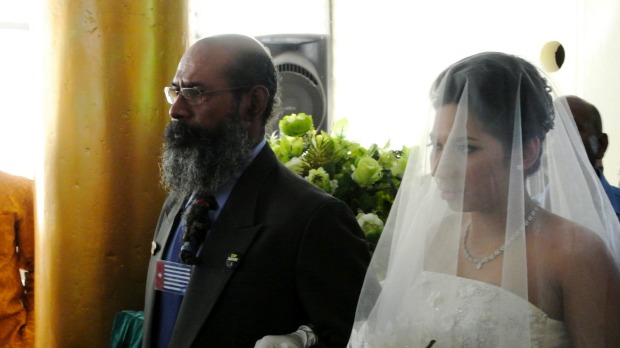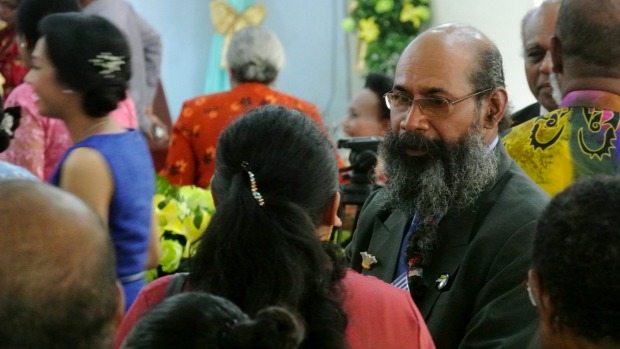Source: The Age
Jayapura, West Papua:Ten years after he was jailed for raising the outlawed "Morning Star" flag, West Papuan independence leader Filep Karma has called on Indonesian President Joko Widodo to voluntarily grant independence to West Papua so that Indonesia is not embarrassed in international forums.
In a secretly recorded interview with Fairfax Media in a hotel room in Jayapura, Mr Karma said Papuans were racially discriminated against, called "monkeys" by Javanese Indonesians, and should have the right "to build our country, our land, upon the culture of being Melanesian, not Malay".
The interview took place when Mr Karma was allowed out of jail briefly on November 15 to attend his daughter's wedding. He was returned by police as soon as the reception finished.

West Papuan independence leader Filep Karma, who was allowed out of prison for a day to give his daughter away at her wedding in Jayapura, defiantly wears the outlawed "Morning Star" flag on his chest. Raising the flag in 2004 saw him sentenced to 15 years' jail. Photo: Michael Bachelard
For his flag-raising, Mr Karma was sentenced to 15 years' imprisonment - triple the term recommended by prosecutors. The United Nations and Amnesty International have named him a political prisoner and demanded his release.
Papuans are preparing on Mondayto challenge Indonesia once again by raising the flag in ceremonies across the country. It's the 53rd anniversary of colonial power Holland first recognising Papuan nationalist symbols in 1961. Local reports indicate police are massing to shut down protests.
Mr Karma, who also remains defiant, wearing a mini-flag to the wedding, has rejected all attempts to grant him remissions for good behaviour, amnesty or parole, believing they would be a tacit admission of guilt.

Filep Karma at his daughter's wedding reception in Jayapura. He was returned to jail immediately after the event.Photo: Michael Bachelard
"It is my right to be freed unconditionally, because it is everybody's right to speak," he said.
Mr Joko is popular among Papuan people and plans to visit the provinces of Papua and West Papua later this month. He recently toldFairfax Media that easing economic disadvantage was a key priority. Social and economic development would reduce separatist sentiment, he said.
But the showing of Papuan independence symbols, including the flag, remain illegal.
New man: Indonesian President Joko Widodo told Fairfax Media in an exclusive interview ahead of his inauguration in October that addressing disadvantage in West Papua was a political priority. Photo: Bloomberg
Mr Karma said that though Mr Joko might be a good man, "we don't know who will be the next president after Jokowi, so he is no guarantee for us".
Drawing the analogy with East Timor, Mr Karma said Indonesia should willingly grant West Papua freedom, not be dragged into it by international pressure.
"I offer a solution and in my opinion it's a win-win solution: if Jokowi truly admits this is a democratic country and it does not colonise Papua, he should prepare the Papuan people for independence. He should facilitate it . . . just like Australia facilitated Papua New Guinea getting their independence."
In that case Indonesia could "step out of Papua with pride and without the need to show embarrassment or hang their heads like when they had to leave Timor Leste", which it "left in embarrassment, and its name was tainted in the eyes of the international world".
The independence push needed international support and should be held in an "independent, free country" so that Papuan activists would have the chance to "sit together and negotiate a solution".
"It took the UN, the United States, the Netherlands and the international community to incorporate Papua into Indonesia, so if negotiations are to be held, they should be done through an international forum."
Once independence was granted, Papuans would say "well, Indonesia was evil and cruel, but it does eventually realise its mistakes and it has acted better now, and it's a truly democratic nation", Mr Karma said.
Indonesia's Minister for Villages and Disadvantaged Regions, Marwan Jafar, told Fairfax Media he believed that if central government money was spent better on services then "the problem of Papua can actually be solved".
He acknowledged there were also human rights issues, but said most of the problems came down to central funds not being spent efficiently in the province.
Papuan deputy police chief Paulus Waterpauw said Indonesian police were now "more knowledgeable about human rights" than they once were, and that Mr Joko had the right approach.
"I think if there is someone who can do what Jokowi does - talk with the people, sit down and eat with the people, listen to their problems then set a policy to solve the problems - I think the Papuan issue can be resolved soon."
- Elizabeth1's blog
- Log in to post comments
